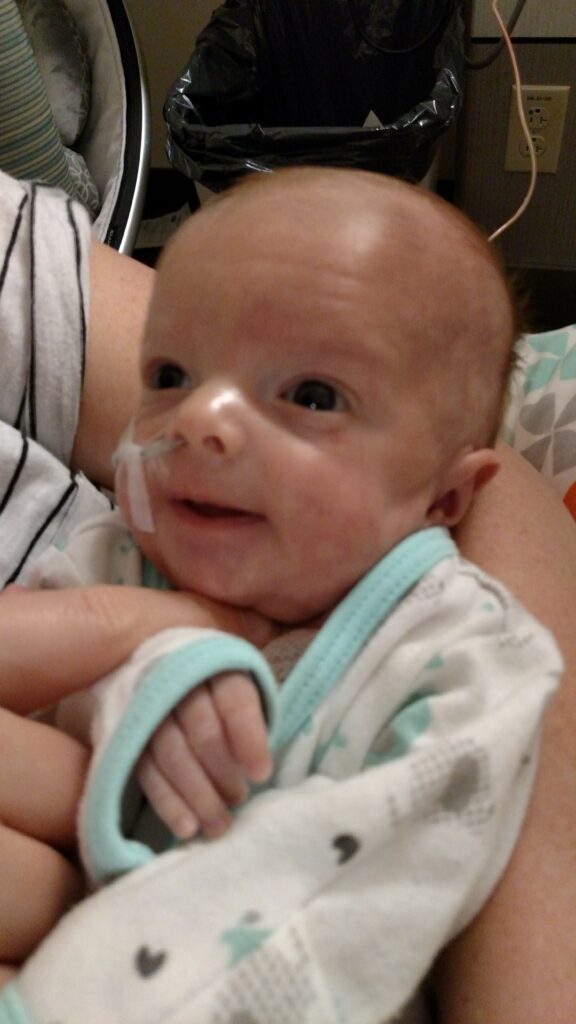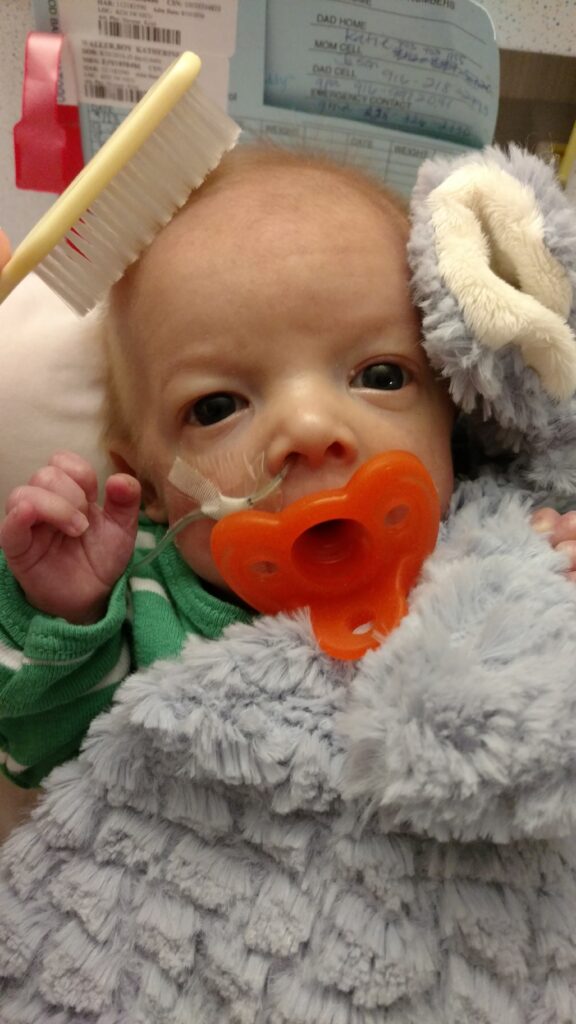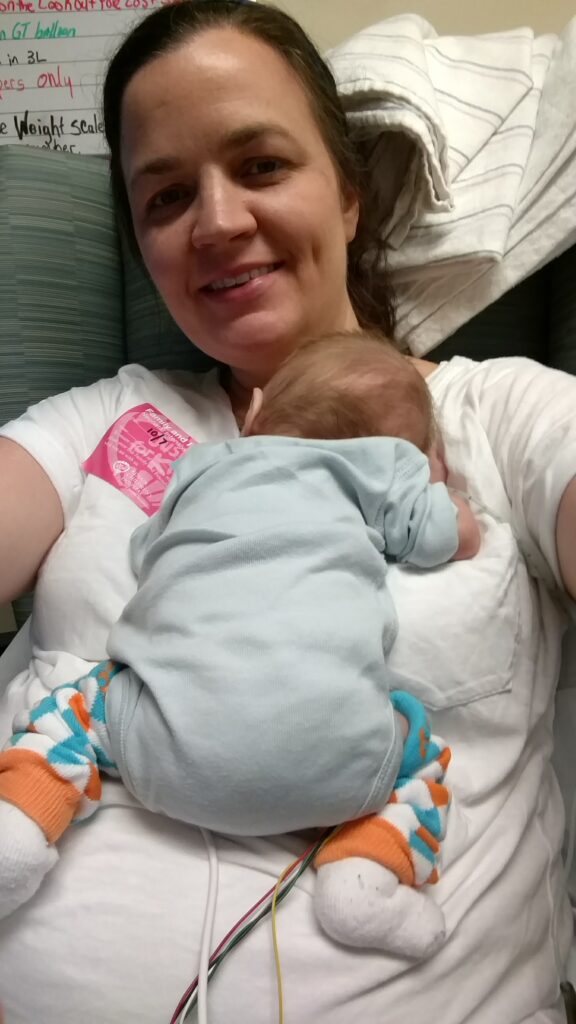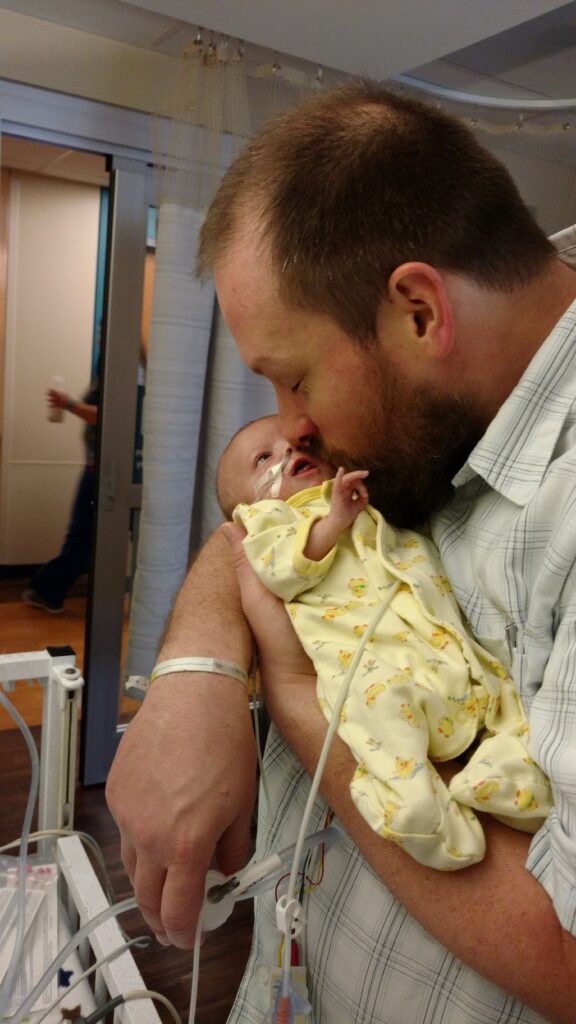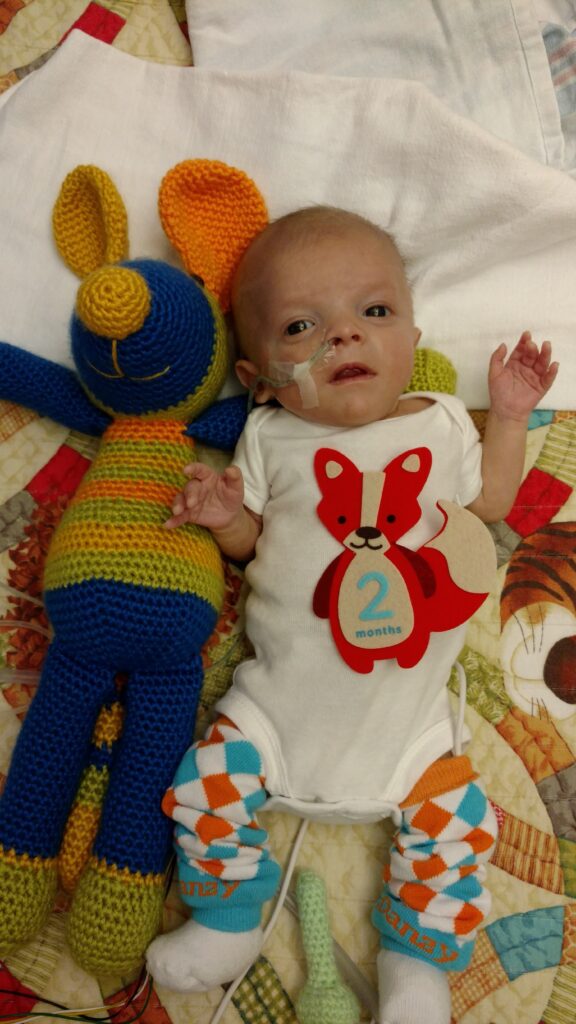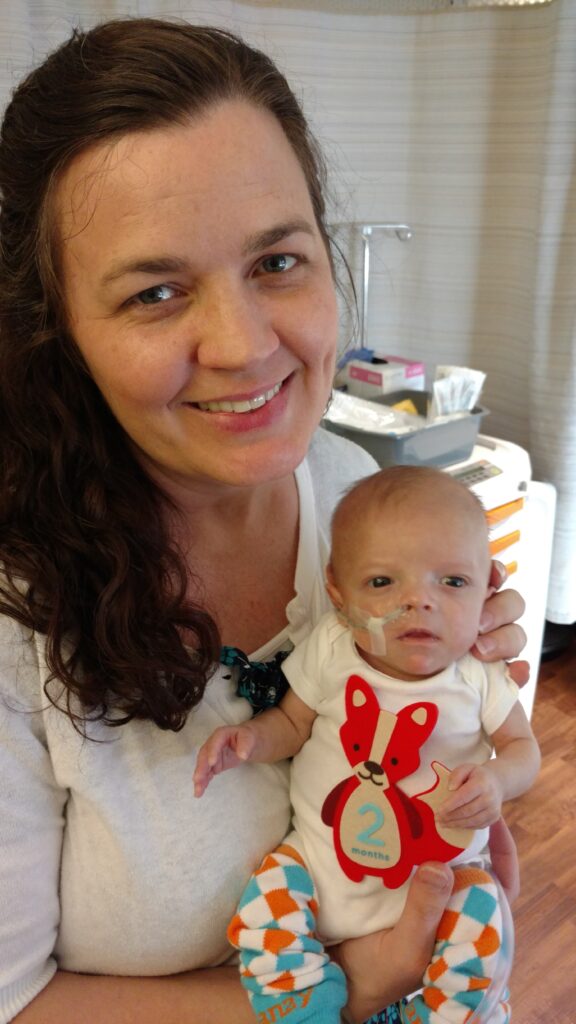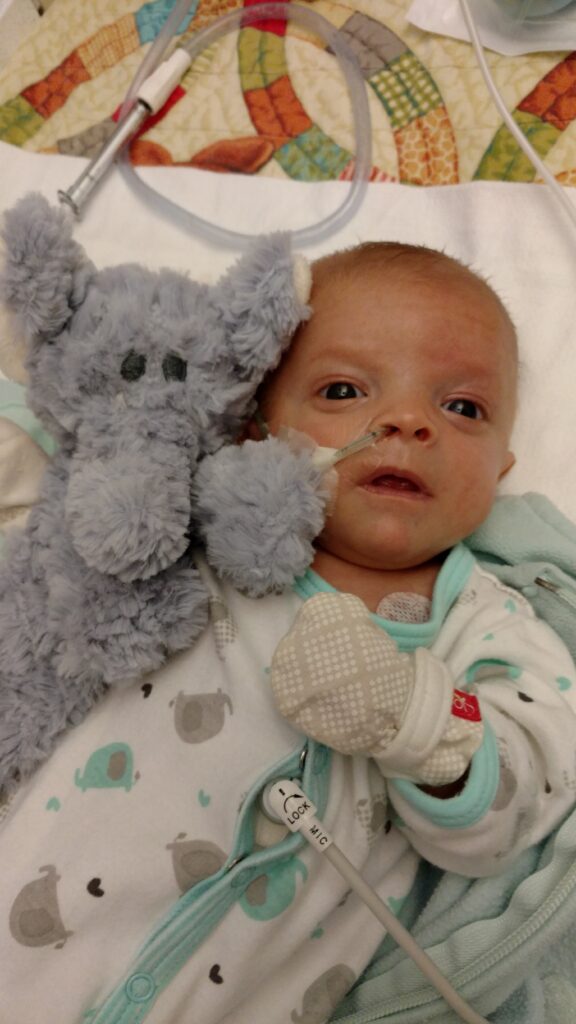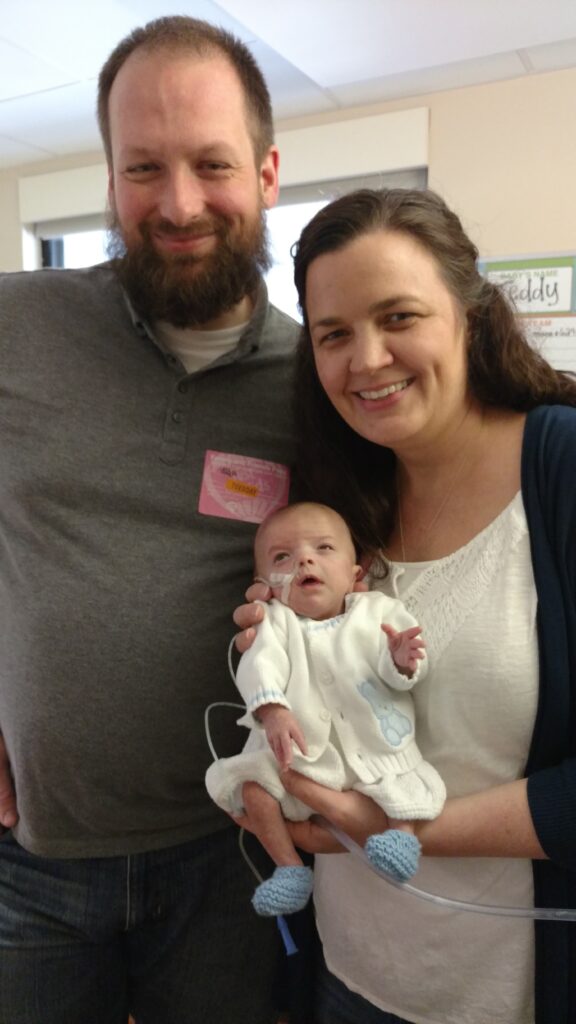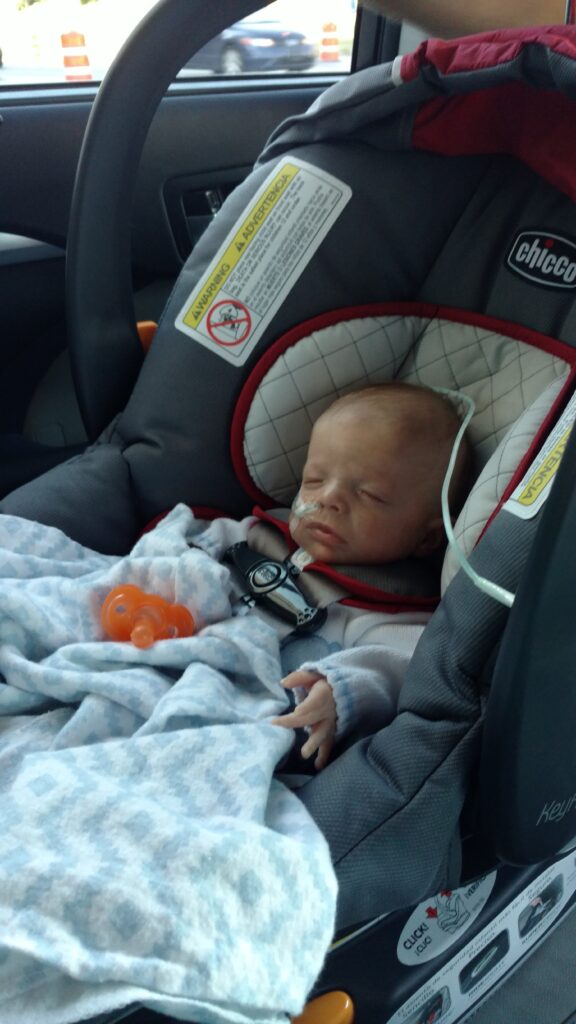I think as any parent can attest to, the day you get to bring your baby home is one of the happiest and scariest days. You are so excited to be able to be home snuggling your baby, you are also worried about how you will manage to do the whole parenting thing. For a NICU parent, that happiness and fear is magnified 100 times. You have spent countless hours sitting in uncomfortable chairs, listening to non-stop beeps and alarms, while living in an episode of Grey’s Anatomy. The thought of finally getting to go home is better than anything you could imagine. But if that milestone comes with a significant amount of wires attached (literally and figuratively), the anxiety makes it hard to think straight. And taking home your baby with a condition like EA that could cause them to aspirate and stop breathing, the fear is overwhelming.
I think that is exactly how Jason and I felt when they first started talking about letting Teddy go home without his esophagus connected. At our local hospital, the surgeon who would be conducting his repair surgery felt that Teddy would be at least 6 months to a year old before his esophagus had grown enough to attempt to reconnect it. When he told us that, we could not believe we might be in the hospital for up to a year before he could even have the surgery! That was a tough pill to swallow, but because Teddy’s EA was considered a long gap, for our local hospital our options were limited and we didn’t know any better. So the options were to wait in the hospital or take him home on continuous suction or get a spit fistula. A spit fistula would prevent the need for suction, because it takes the top pouch of the esophagus and connects it to the neck, allowing the salvia to drain into a rag around the neck. While sometimes it is the only option, it does potentially create more issues when they do go in and try to reconnect the esophagus and if I am being honest it is something we definitely did not want to deal with if we didn’t have too.
So as Teddy became more and more stable, shocking everyone, they began talking to us about taking him home on suction to wait until he was big enough to attempt reconnection. As scary as it was, being home and living a “normal” life sounded amazing. The catch was that Teddy would come home with a continuous suction machine, a more powerful suction machine to use when things were blocked, a feeding pump, and more medical supplies than I thought possible. Thankfully at the time he didn’t require oxygen, so we would not be lugging around oxygen tanks too. Our hospital case worker got on the case and started working with insurance to get everything set up. Thankfully there had been another family at our local hospital a few years earlier who had taken their baby girl home unrepaired, so they had a blueprint to follow as they began trying to set everything up. And that other mother, that amazing wonderful mother, became one of the most important people in our journey and we are so thankful she entered our lives.
As the preparations continued over a few weeks, our training really ramped up and what was us just trying to be a part of his daily cares became us having to become his full time nurses,so that we were fully prepared to bring him home. We were also told by our case worker that insurance would not approve us getting a home nurse, sooooo we were going to be on our own. So what did I do? Go to the Facebook parent groups to ask for guidance. Now one of the 1st things I tell a new parent with a medically complex child is to find the parent support group. I truly believe they are the most important part of fully understanding your child’s condition and getting the support you need to get them the best care. But as with anything, you have to take the good with the bad. Someone who could mean well, may not be able to articulate it in a way that doesn’t come off as condescending and rude. And everyone has their own personal experiences and opinions that they may try to over power the conversation with. Even with that, parent groups truly are the best resource out there for medical kiddos and I am so thankful for the ones we are a part of.
So I posted on the parent group about us having the opportunity to bring Teddy home unrepaired and, oh my, I was not prepared for the onslaught of comments. Bringing home an unrepaired child is rare because it is dangerous, very dangerous. Unfortunately there has not always been a happy ending. While most of the comments were related to that and basically were talking, we were crazy and basically had a death wish for our child (I am paraphrasing here). I was horrified and told Jason maybe we shouldn’t do it. There were a few comments that were supportive though and one of those happened to be the local mother that had taken her daughter home a few years earlier. We connected and had a phone call and I instantly felt better that we could be successful taking him home. She was (and is) so amazing and helped us navigate it all, even mailing us all of her old backup equipment for free!
While some hospitals refuse to send children home unrepaired (including Boston), we never would have considered taking Teddy home if our team of doctors and nurses were not all on board with the idea. Due to Teddy’s shallow upper pouch, he had always managed his secretions well, even clearing them himself sometimes, with rare clogs of the suction tubing. He never once aspirated and so they felt the risk was minimal. Because of our situation and the options available at our local hospital, everyone felt Teddy would do better at home while we waited for him to grow. We also got the sense he wasn’t “sick enough” for the insurance to keep covering the NICU, which I know was true, but was being hinted at. Looking back now, I remember this underlying feeling we were getting the ole “You don’t have to go home, but you can’t stay here” edging towards the door. I 100% believe they 100% felt like Teddy was ready and capable of being home while he waited and since they did not have a lot of experience with this condition, they were not really sure how to present it to the insurance company, so we were getting more “no” answers from the insurance company than we should have been.
So we jumped in with both feet and got ready to take our baby home. We posted our baby registry and started scrambling to get the house ready. We bought a Halo and an Owlet. Multiple monitors, baskets to carry equipment, and anything else I saw anyone post they used for their medical kids. We figured out a game plan on how to navigate a 3 story house with a child attached to several heavy medical machines. Teddy was still teeny tiny. At 2 months old, he had finally hit 5lbs, but finding a carseat that he would be safe in was difficult. Once we finally found one, the biggest test for any NICU baby is passing the car seat test. That requires a baby to be strapped into the car seat and maintain their oxygen levels for a certain period of time. Well, Teddy failed, multiple times. As soon as his tiny little body got scrunched up and strapped in, the screaming would start and the oxygen would drop. After several failed attempts, they decided to try it in the middle of the night when he was asleep and he passed! I am not sure how I feel about this middle of the night attempt now, because I believe the failing of the car seat test was a sign of things to come, but at the time I was so excited that he had passed. That meant he was cleared to go home.
So exactly 2 months and 1 day after he was born, on October 11th, we got Teddy dressed in his going home outfit, took a ton of photos, and gave as many hugs and thank yous as we could as we walked out with one of Teddy’s favorite nurses (ours too) and drove home as a family for the very first time. The feeling of JOY was overwhelming, while the absolute fear brewed in the background.
****For any new EA parent that happens across my blog, please know this our story and our story alone. Please do not take this chapter and the following ones as me recommending that a child be taken home unrepaired. Taking home an unrepaired child is very dependent on the child and their specific situation, as well as the hospital and available treatment options. Always remember to get second and third opinions before deciding on anything, especially on treatment plans or taking a child home. Something I wish we had done sooner in Teddy’s story.****
